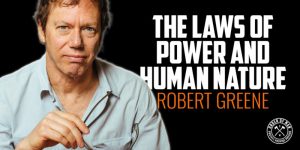I spent that whole day watching Robert Greene, listening to him, reading him... And had a question to you:
What is the difference between a worldview where you look through definitions and a worldview where you look through distinctions.
Definition vs distinction
The first thing to do is to see what is a definition. Whatever you define: you talk about it. It's characteristics, and you try to be as descriptive and as exactly as possible.
Our current scientific approach is definition based, and it's actual accuracy is 10% or less. In some areas of science maybe higher, other areas lower.
You can say a million words and you'll not get much closer to accuracy. You won't know more about the subject than before.
Whereas if you use inversion the method of distinguishing, you can get very clear with very few words. Robert Greene uses definition, I use distinguishing...
For example medical diagnosis: the accuracy is 20%. This means that we misdiagnose, misidentify stuff, because by its nature, definition does not offer a way to say: if two thins are very similar and have similar characteristics, which one are we looking at?
My next door neighbor was diagnosed with 4th stage breast cancer about eight years ago. She is still alive, she is still sick.
Muscle-test says she doesn't, she never had cancer. But she was ill. The disease she has is still there, untreated: it is masked by the chemotherapy and whatever else the woman gets...
Misdiagnosis is not necessarily the diagnosing doctor's fault: it is the science's...
The description can be 100% accurate, the definition can be complete... and yet when applied, the truth value of the findings is low, surprisingly low.
The other way to approach life, science, medicine, health, or whatever you want to approach is through distinguishing.
Distinguishing is interested only in what it isn't... and allows that 'negative' story (what it isn't, even if it looks similar to it) tell the whole story. Like inversion...
Distinguishing is hard. Why? Because our nature is to look at the thing, and not an the space around it.
I remember having a new view of life some years ago when in a class we were instructed to go outside during a break and look at the world through the spaces between things: between trees, blades of grass, between clouds, the space between people.
That echoed an exercise I did some 34 years ago where the instructions were: move towards the open space... It was the 6-day program...
Both exercises transformed my life. Previously I would bump into everyone, I would upstage people, I would butt heads, I would argue, I would compete... but not after.
I got intensely curious about the space outside of a thing, about the space in between. And found that the space in between more precisely defined a thing that any definition of the thing can...
And I got hooked on distinguishing...
Of course distinctions are 'invisible' for two reasons:
- 1. people don't look at them, don't look for them. They look squarely for the things, not for the 'not-the-thing'.
- 2. distinctions are part of the 'I didn't know that I didn't know' universe... And for the most part it takes a lot of awareness, astuteness, observation, presence of mind to make any headway.
No wonder that people alive today, on average, have zero number of distinctions, and even highly evolved or education people only have a few.
Muscle test says there are 700 possible distinctions. Source who tells the muscles what to do sometimes mocks me... when I ask: Are you mocking me? the answer is 'yes'.
Which probably means that there are endless number of distinctions one could master...
That word 'master' indicates that there are levels to which you master a distinction... meaning:
how much of it can you reliably SEE and RECOGNIZE operating?
Even at 2% level of mastery sets you above others who have none...
I am reading a book by my ex teacher, Robert Plank. It is all transcribed talks... and the transcriptionist is bad, and Robert was lazy at editing the transcription.
I was sure I was going to hate the book, but to my surprise, I have room for the bad English, the missing words, the repeated words, and glean what he meant to say. And what he meant to say is good... I need it... I want it...
Now I have a choice of paying attention to the noise, the mistakes, or to have room for the noise and pay attention to what he meant.
Surprisingly this behavior, this attitude is a distinction I teach in the Amish Horse Training Method...
but that course is proof: unless you distinguish for yourself what is noise and what is not noise, you won't have the distinction, and your life will be, ahem... shitty.
Cinderella needed the ability to distinguish... and to her luck the birds had it... The birds could tell the difference between something you should keep and something you should chuck.
I spent the first two hours of today studying Robert Greene who rose to fame when he published the 48 laws of power, and followed with other similar books...
I had never heard of him before, even though muscle test says ...
we have a 90% overlap in what we speak about.
People eat up what he says, eat up what he writes.
Even though he is somewhat decent at distinguishing, he talks in the language of description, definition, and the crowds take to that.
Can people, do people actually benefit from reading his books? Muscle test says 'no'. How much do they, can they implement? 1%.
But the most important part: they never distinguish anything themselves, and therefore they never 'grow' distinctions, the currency of life... with which you produce results in life.
It's a lot like reading a medical book, every disease seems to fit your symptoms... while you probably have none of them.
Without distinguishing everything is the same as everything else... except not always.
I am most interested in distinguishing human behavior, attitudes, and the invisible puppet strings that render you a puppet and render you being and acting powerless.
In all my courses I teach through distinctions, and now you could actually start learning to distinguish... little by little.
In my new Distinctions podcast, in my conversations with Bonnie, who is a DO, Optometrist doctor, we target distinction each call and you, like her, can start to distinguish stuff for yourself.
It is not your traditional learning modality, just like any real learning, you need to do all the work yourself... much like you would with clay, while finding out what you can build with that.
You'll find out the limitations, the boundaries, and nearly everything about the clay... mostly what it can't do...
And that is where the two processes are the same. You'll find out what a distinction is and what it isn't.
I today's conversation (podcast) I assigned the distinction: 'responsibility, access to power' to Bonnie, and next session she'll report all the ways she learned it is not what she thought it was going to be, or the opposite.
This is her first attempt, so if you join now, you'll be on the same footings.
The podcast is in my mobile app... but in a few weeks it will also be available on the desktop, and is already available on tablets...
Update:
It is now about 18 months later... or 78 calls later. And... drumroll... Bonnie finally got her first distinction. Why did it take so long? I think first it was an attitude issue... the 'I know better' thing so many people say in their heads. And maybe I didn't teach, didn't emphasize why distinctions are important.
One think I had definitely never said that to be able to learn and to grow what you can use in life, you need distinctions that clump together. The famous clumps...
For reasons of their own, distinctions allow for finding similarities, real similarities, connections, as in 'connecting the dots', while definitions don't.
The moment you have at least one distinction, you may be on your way to become someone teachable. Until then any teaching will be wasted on you.
Listen to yesterday's call (12/9/2022) to maybe learn your first distinction.
PS: I love this long interview with Robert Greene. To answer what is the similarity: we were born with the same soulcorrection, and often he says things exactly the same way I would say... eerie. The difference? Maybe this: I try to train people in the things he writes about, instead of just writing about them.
PPS: Here is Robert Greene's Ted talk


